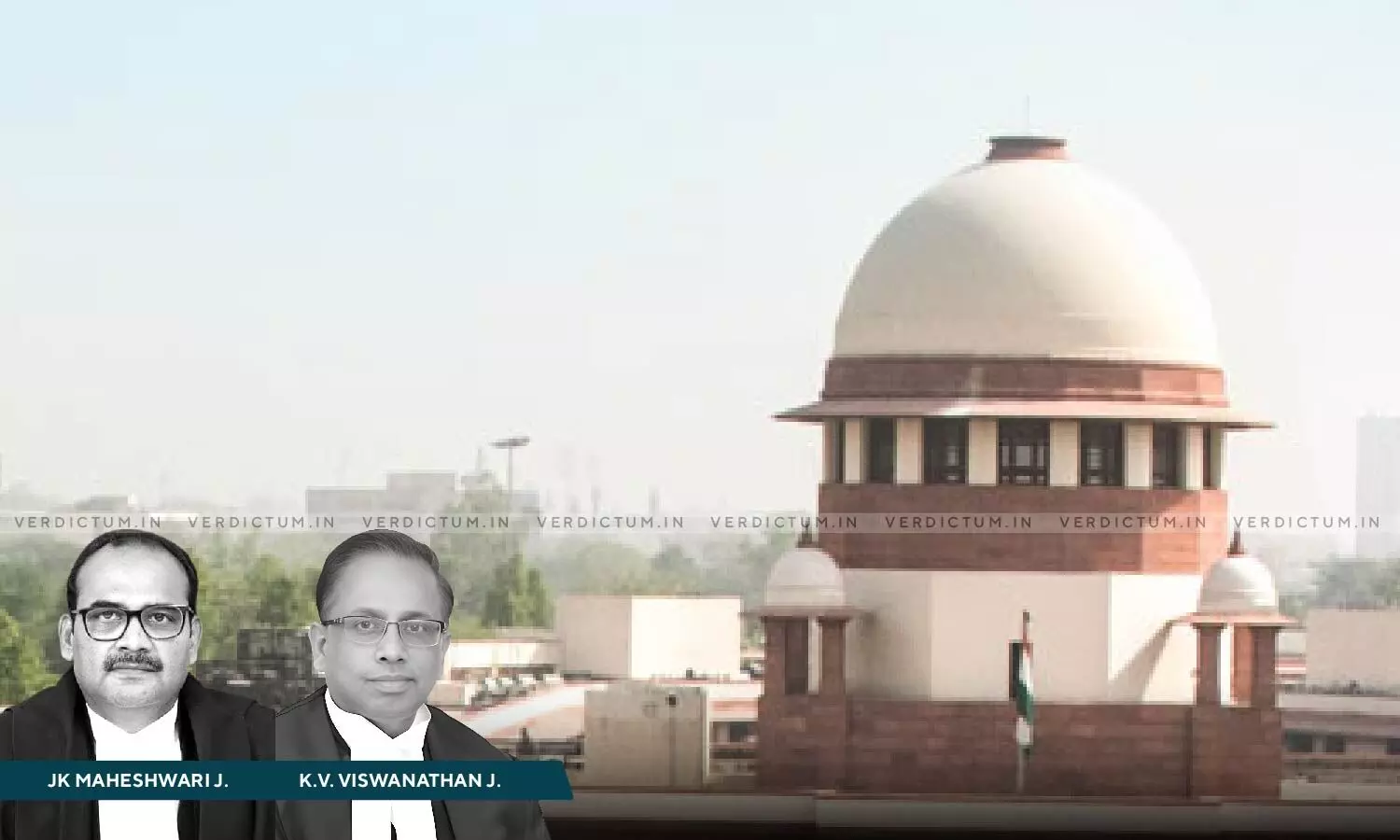
Discretion Cannot Be Based On Whim & Caprice Of Decision Making Authority: SC Allows Law Teacher's Appeal Against Denial Of Confirmation Of Service
 |
|The Supreme Court observed that the denial of service to a teacher by the University despite his/her satisfactory performance, amounts to an arbitrary and unreasonable exercise of power.
The Court observed thus in a civil appeal questioning the correctness of the judgment of the Tripura High Court.
The two-Judge Bench of Justice J.K. Maheshwari and Justice K.V. Viswanathan held, “In this background, particularly when the Appellant was put through the fire test of a regular selection, was the University justified in denying her confirmation when all the contingencies were cleared with the vacation of the lien and the performance being satisfactory? We think not. The University cannot be heard to say:- ‘may be the lien is vacated, and your performance is satisfactory, but we do not want to confirm your service’. The Respondent-University, being a statutory body, any such conduct would tantamount to an arbitrary and unreasonable exercise of power, apart from being unfair.”
The Bench added that the discretion vested in the Executive Council of the University should be exercised in a fair and non-arbitrary manner which cannot be based on the whim and caprice of the decision-making authority.
AOR Ghanshyam Joshi represented the appellant while Advocate Sujeet Kumar represented the respondents.
Factual Background -
One Dr. Praveen Kumar Mishra was working as an Associate Professor in Law in the Tripura University (respondent). In 2015, the Executive Council of the University granted a lien for one year to him to enable him to join the post of Associate Professor in Law in Sikkim University. Thereafter, in 2016, the University issued an advertisement via an employment notification for various posts by inviting applications from suitable candidates. In the Department of Law, for the post of Assistant Professor, three vacancies were advertised. One was an unreserved regular vacancy, one was a lien vacancy in the Open category, and one was a lien vacancy for the OBC candidates. In the note appended in Clause 19, it was mentioned “Appointment made to the posts against LIEN vacancy are likely to be regularized subject to vacation of lien and satisfactory performance.” Importantly, it was a common advertisement for all the three vacancies.
Pursuant to the appellant’s application for the post of Assistant Professor in Law in UR category, she was asked to appear before the Selection Committee. About 16 candidates including the appellant and one Brij Mohan Pandey were called for the interview. Thereafter, by virtue of an employment notice, the appellant was expecting her regularization since there was nothing adverse in her performance. However, in the meeting of the Executive Council, the appellant was not confirmed while other teachers working in their respective posts were confirmed, and the Council resolved to re-advertise the post. On getting no response from the authorities, the appellant filed a writ petition before the High Court but the Single Judge dismissed the same. The Division Bench also affirmed the Single Judge’s order in an appeal filed by her. Being aggrieved, she approached the Apex Court.
The Supreme Court after hearing the contentions of the counsel noted, “The Respondent-University, being a statutory body, any such conduct would tantamount to an arbitrary and unreasonable exercise of power, apart from being unfair. The discretion vested in the Executive Council should be exercised in a fair and non arbitrary manner. It cannot be based on the whim and caprice of the decision-making authority. If asked to justify, the Executive Council must have good reasons to defend the exercise of power. In this case, alas, there are none. The resolution of the Executive Council denying confirmation and preferring readvertisement is delightfully vague and offers no justification. The justification desperately attempted in the counter affidavit to defend the decision has, as demonstrated above, come a cropper.”
The Court held that in the absence of any material indicating unsatisfactory performance, in the ordinary course of things, fair and just exercise of power would require that the appellant be confirmed against the vacancy since there was no more a lien being exercised by Dr. Praveen Kumar Mishra.
“The reasoning given by the learned Single Judge and of the Division Bench, as demonstrated above, are fallacious. The Appellant has, after undergoing the regular selection process, been working since 17.01.2017, for the last seven years and approximately six months. Even in the impugned order, pending the proposed re-advertisement, she was continued in service”, it also noted.
Furthermore, the Court observed that no prejudice to public interest could have been caused as eligible candidates desiring the appointment would have anyway applied to compete for the regular slot and in view of this, it found that the legitimate expectation was not outweighed by any overriding public interest.
“We further issue a writ of mandamus directing the Respondent-University to place the Appellant’s case for confirmation before the Executive Council and that the Executive Council and the Respondent-University shall pass appropriate resolution/order(s), in accordance with the findings given in the present judgment. The said exercise is to be carried out within four weeks’ time. The Appellant should also be given all consequential benefits”, it directed.
Accordingly, the Apex Court allowed the appeal and set aside the judgment of the High Court.
Cause Title- Maitreyee Chakraborty v. The Tripura University & Ors. (Neutral Citation: 2024 INSC 616)
Appearance:
Appellant: AOR Ghanshyam Joshi and Advocate Chirag Joshi.
Respondents: Advocate Sujeet Kumar and AOR Randhir Kumar Ojha.